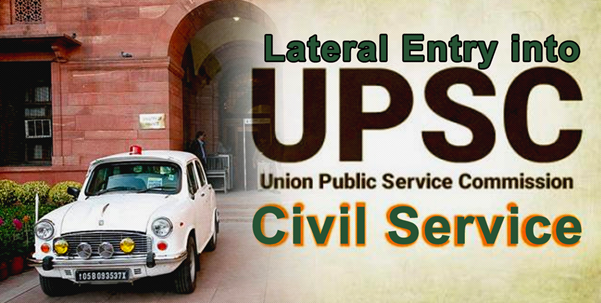Description

Copyright infringement is not intended
Context: The Union Government stated that the lateral entry appointments to introduce best of the best talent for a particular task, coupled with expertise.
Details
- In 2018, The Ministry of Personnel, Public Grievances and Pensions had, in June 2018, invited applications for joint secretary-rank posts through lateral entry (appointment of private sector specialists in the government) for the first time.
- This policy also means that personnel from the private sector are selected to an administrative post of the government.
About Lateral Entry
- It is an Idea to infuse outside talent and harness and make use of the knowledge of domain experts from outside the system.
Arguments in favour of Lateral Entry
- Helpful in Policy Making - It is essential to have people with specialised skills and domain expertise in important positions as policy making is becoming complex in nature.
- Increase in efficiency and Governance - Career progression in the IAS is almost automatic which could put officers in a comfort zone. Lateral entrants could induce competition within the system
- Shortage of officers - According to a report there is a shortage of nearly 1,500 IAS officers in the country.
- Baswan Committee (2016) had supported lateral entry considering the shortage of officers.
- Recruitment of IAS officers at a very young age makes it difficult to test potential administrative and judgement capabilities.
- Not a new phenomenon - It has been successful in RBI and the erstwhile Planning Commission, as well as its successor, NITI Aayog.
- It is impossible to run a 21st century economy with a 19th century bureaucracy using 18th century rules.
- The System needs Fresh energy, specialised skills and knowledge.
Arguments against Lateral Entry
- Some retired officers and political opponents consider this as the beginning of the end of a neutral and impartial civil service with the likely induction of loyalists.
- Demoralised the Steel frame of governance.
- Officers at this level are not selected to maximise profits or to market some product or service, as maybe the case in the private sector.
- Bypassing constitutional mechanism - Constitution clearly stated that UPSC alone has the mandate to conduct examinations for recruitment to civil service jobs in the Union government.
- Therefore, the Government's decision to recruit joint secretaries from outside the system, undermining the authority of UPSC.
- Lack of field experience - Civil Servants have sufficient experience of working at the village, district and state level.
- Civil Servants understand how policies are implemented and the shortcomings of various policies.
- When they rise to the rank of a joint secretary, they earn vast practical experience in their Field which enables them to craft and design dynamic policies.
- Lateral entry, divorced from reality, will have little or no idea of how policies are implemented at the grass-roots level, hampering the policymaking process.
- This can choke an already suffocated system.
- They can, at best, be roped in as consultants in an advisory role to offer expert advice, offering them a decision-making position would be dangerous for smooth governance and will lead to turf-wars.
- Earlier experiences - The past experience of inducting private-sector managers to run public-sector enterprises has not been particularly satisfactory. Ex- Air India, Indian Airlines etc.
- Concern about Nepotism, Corruption in postings.
- An outsider will not understand the government working. Their knowledge may be different from ground realities.
- Risk of powerful corporate groups placing their men in key positions of government.
Way Forward
- Need to understand the role and functions of a joint secretary serving in Union government. A joint secretary-level officer aid the political executive bearing in mind that the ultimate objective of public policy is to maximise social welfare.
- Lateral entry, at best, should only be an exception and not the norm. If shortage of civil servants is being felt, the number of recruitments made through the annual civil services examination can be gradually increased. Overhauling the current system of recruitment by altering the pattern of examination and the training format could be considered.
- Government must ensure that only candidates, the likes of which are not available in the existing system, are appointed. If that turns out to be truly outstanding, there should be provisions to induct them permanently in the government with approval of UPSC.
- Government cannot sit back and wait for Private sector talented candidates to present themselves; it must proactively identify and approach executives with the desired skills and experience.
- For any desired outcome, the Government needs a lateral policy which needs to be free from Nepotism, favouritism, Conflict of Interest, Political interference, bureaucratic hurdles, and selection should be Transparent and only based on Merit and Experience and opening a limited public department for private sector professionals.
https://www.pib.gov.in/PressReleasePage.aspx?PRID=1808364













